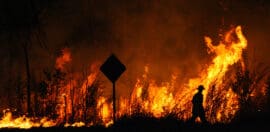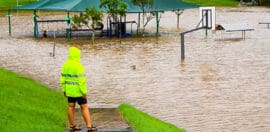A climate emergency has been declared. But what now?

26 June 2019 at 5:37 pm
Sydney has officially declared a climate emergency. But what does that actually mean? And how does that stack up to what is happening in the rest of Australia and the world?
The city council announced on Tuesday it had voted to declare that climate change posed a serious risk to the people of Sydney, and should be treated as a national emergency.
Lord Mayor Clover Moore asked the council to call on the federal government to respond urgently to the emergency by reintroducing a price on carbon to meet the Paris Agreement emissions reduction target, and by establishing a Just Transition Authority to ensure Australians employed in fossil fuel industries find alternate, suitable employment.
“Successive federal governments have shamefully presided over a climate disaster, and now we are at a critical juncture – we face a climate emergency,” Moore said.
“It is clear that the current federal government’s policies are simply not working and I call on council to declare a climate emergency and step up our efforts to hold the federal government to account.”
All nine councillors in the room voted in favour of the motion, a move welcomed by the Climate Emergency Declaration campaign which is supported by over 50 climate action groups including the International Climate Emergency Forum, Extinction Rebellion, and Greenpeace Australia.
Moore outlined Sydney’s action on climate change since 2007, and committed to accelerate work in the development of a strategic plan to 2050.
“We set a goal to reduce our emissions by 70 per cent by 2030, and – following the Paris Climate Agreement in 2015 – we set a more ambitious goal to reach net zero emissions by 2050,” Moore said.
“We became Australia’s first carbon neutral council in 2007, and as of June 2017, we’d reduced emissions in our own operations by 25 per cent. In 2020, we will be powered by 100 per cent renewable energy, allowing us to meet our 2030 target by 2024 – six years early.”
Why is declaring an emergency important?
Amanda McKenzie, CEO of Climate Council Australia, told Pro Bono News that Sydney had been a leader in climate action for a number of years, and making an official declaration to mark the severity of the matter was valuable.
“This declaration is important, and it matches the types of actions that the City of Sydney has been taking,” McKenzie said.
“They are putting their money where their mouth is.”
Sydney joins over 600 jurisdictions in Australia and around the world who have already declared a climate emergency. McKenzie said this kind of grassroots action demonstrated how everyone could do their part in tackling the problem.
“This declaration from so many groups is a strong message for hope, which is that councils in particular are taking action and making change at the ground level,” she said.
“What I take away from it is that there is a role for everybody, whether you’re in local government, whether you’re in business, whether you’re in a school, there is a role for you to play in tackling climate change.”
Nic Seton, deputy director of Greenpeace Australia Pacific, told Pro Bono News when governments of any level declared a climate emergency and committed to transitioning to 100 per cent renewables it marked a big change.
“When that change happens at scale, incredible things can happen,” Seton said.
“Over 600 jurisdictions representing over 80 million people have already declared a climate emergency, and as we’ve seen this past week, with Hobart, Sydney, and the entire Australian Local Government Association, change is coming, and it’s coming from the ground up.”
How is Australia tracking compared to the rest of the world?
In Australia, 24 local jurisdictions have declared a climate emergency, with the first being the City of Darebin in late 2016. This compares to 136 in the UK, and 432 in Canada.
The UK, France, Canada, and Ireland have recognised the emergency on a national level.
McKenzie said Australia was seriously falling behind its international counterparts.
“The federal government has cut a number of climate change programs, and our pollution levels have been rising, which is in contrast to many of our allies around the world like the United States and the UK where pollution levels have been falling,” she said.
“Australia is a really important player internationally, and we’re the 15th largest polluter in the world which means 180 countries pollute less than us.”
But she said it was important to hold onto hope.
“We haven’t been great in the last few years but where action is occurring is at the local and state government level, and that’s been really important in pushing us in the right direction,” she said.
The role of civil society
With the effects of climate change already targeting some of society’s most vulnerable, McKenzie said that civil society and community organisations needed to be at the front of action on climate change.
“Whether that’s elderly people suffering from heat waves, homeless people suffering from extreme weather events, we need to ensure that all civil society organisations are cognizant of the issues and preparing for worsening climate change,” she said.
“For too long this has been conceptualised as an environmental issue separate to people but ultimately this is a people issue, and it’s about the type of society that we will live in the future.”
She added that philanthropy and impact investing schemes needed to step up in place of missing federal government action.
“With the lack of federal government action it really underpins why philanthropy is so critical in the climate change,” she said.
“It [climate change] has been a relatively neglected area, so there’s actually the advantage of philanthropists looking to get into the space can actually make a big difference quickly.”
Seton also said it was important social sector groups engaged their local governments on the issue.
“Civil society and community organisations can play a part by encouraging their own local government to declare a climate emergency and make clear goals to transition to 100 per cent renewable energy,” he said.







